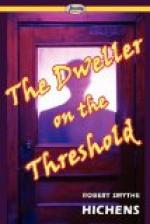Then the window was shut very softly.
* * * * *
Three days later Malling saw in the papers the news of the complete breakdown of Marcus Harding. “Nervous prostration,” was the name given by the doctors to his malady, and it was announced that he had been ordered to take a sea voyage, and was preparing to start for Australia with a nurse.
Soon afterward Malling was walking in the afternoon down Pall Mall, wondering deeply what would happen, whether the rector would ever start on that voyage, when he came upon Professor Stepton sidling out of the Athenaeum.
“Heard about Harding?” jerked out the professor.
“Yes. Has he sailed for Australia?”
“Dead. Died at half-past three o’clock this morning.”
Malling turned cold.
“Poor fellow!” he said. “Poor fellow!”
The professor was drawing his plaid shawl round his shoulders. When it was properly adjusted, he began to walk on. Malling kept almost mechanically beside him.
“Did you expect this?” Malling asked.
“Well, I knew he was failing.”
“And Chichester? Have you seen Chichester since his death?”
“No. Would you like to see him for me?”
Malling was deep in thought and did not answer.
“Do you think?” said the professor, “that Henry Chichester will be greatly affected by this death?”
“Affected? Do you mean by grief?”
“Yes.”
“I should suppose that to be highly improbable.”
The professor shot a very sharp glance at Malling.
“I’m not sure that I agree with you,” he observed dryly.
“Have you seen him lately?” asked Malling.
“Not quite recently. But if I had seen him, say, yesterday, I don’t think that would greatly affect my present dubiety. I should, however, like to set that dubiety at rest. Are you busy to-day?”
“No.”
“I am. Will you make a little investigation for me? Will you go and pay a visit of condolence to Chichester on the death of his rector, and then come round to the White House and report?”
“I will if you wish it.”
“I shall be in after seven.”
“Very well.”
“I dare say you will be surprised,” observed Stepton. “I see my bus.”
Malling left him imperatively waving his arm, and, turning, walked toward Kensington.
What were his expectations? He did not know. Stepton had upset his mind. As he went on slowly he strove to regain his mental equilibrium. But he could not decide exactly what Stepton had meant. He felt inferior to the professor as he turned into Hornton Street.
He did not hesitate, but went at once to the curate’s door and rapped. No one answered. He rapped again, and touched the bell, half hoping, even while he did so, that there was no one within to hear.
But an inquiring head appeared in the area, observed, and was sharply withdrawn. Steps sounded in the passage, and the maid Ellen presented herself, looking somewhat disordered.




